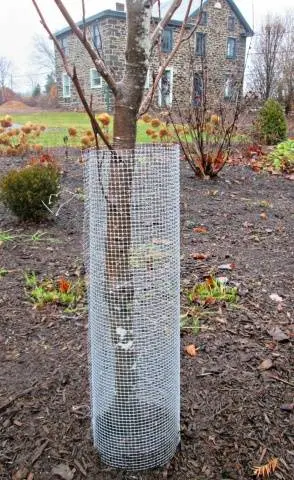Contents
A gift for teachers is an early cherry variety, beloved by gardeners in central Our Country. Given the characteristics of the variety, its strengths and weaknesses, by planting a tree according to the rules and properly caring for it, you can get stable good yields from year to year.
History of breeding
The early cherry variety Gift to Teachers was bred artificially on the basis of the All- Research Institute of Fruit Crops Breeding in the city of Orel. The authorship of the variety belongs to A. F. Kolesnikova, A. A. Gulyaeva, A. V. Zavyalova and E. N. Dzhigadlo. It was obtained as a result of crossing the self-fertile high-yielding winter-hardy cherry Lyubskaya with the early Orlovskaya, resistant to coccomycosis.
State tests of the variety have been carried out since 2003.
Description of the culture
Variety Gift to teachers is characterized by medium-sized trees, no more than 3 m tall. Their crown is raised, spreading, rather wide, rounded and of medium density.
The bark on the lower part of the trunk and on the main branches is smooth and brown. Shoots are straight, medium in size.
Cherry leaves A gift for teachers – dark green, in the shape of an egg. The leaf blade is serrated along the edge, has a pointed tip. The surface is flat, matte, smooth. Petiole 17 mm long and almost 2 mm thick, colored with anthocyanin pigment.
The buds (growth and flowering) are slightly deviated from the shoots, they are about 4 mm long.
The shape of the fruits of the cherry Gift for teachers is round, the color is dark red. There is no wax coating on the surface. The pulp is red, juicy, moderately dense. The average weight of the fetus is from 4,1 to 4,5 g; while the bone is about 6% of it. The stone of the cherry of this variety is round, separated from the pulp without difficulty. The length and thickness of the stalk is medium.
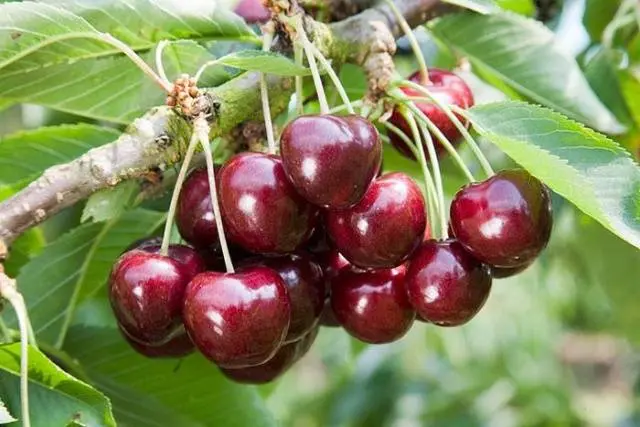
The durability of trees is considered high.
Fruiting abilities of cherries A gift to teachers are revealed to the maximum in the Belgorod, Voronezh, Kursk, Tambov, Lipetsk, Oryol regions of the Federation.
Features
Drought resistance, winter resistance
By the method of laboratory research, it was revealed that the potential for winter hardiness in cherries Gift to teachers is very high. With reversible damage to the kidneys and tissues, this cherry variety is able to withstand temperatures down to -38 degrees (in the dead of winter) and up to -20 (after the onset of a thaw).
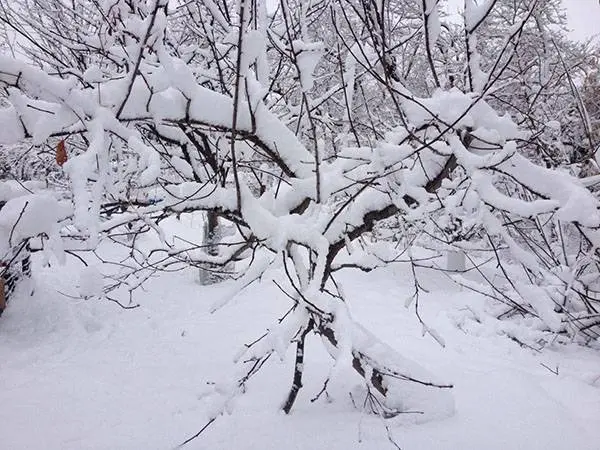
In particularly unfavorable years, the rate of freezing of flowers is about 0,9%.
After evaluating the water-holding capacity of the leaves and the level of restoration of their water content, the scientists characterized this cherry variety as a form with a high degree of heat resistance – the ability to tolerate high temperatures. However, in terms of drought resistance (the ability to tolerate a prolonged lack of water), Gift to Teachers did not receive a high rating, yielding to many other varieties.
Flowering period, pollination and maturity
Cherry blossom period Gift for teachers – medium (from 15 to 20 May).
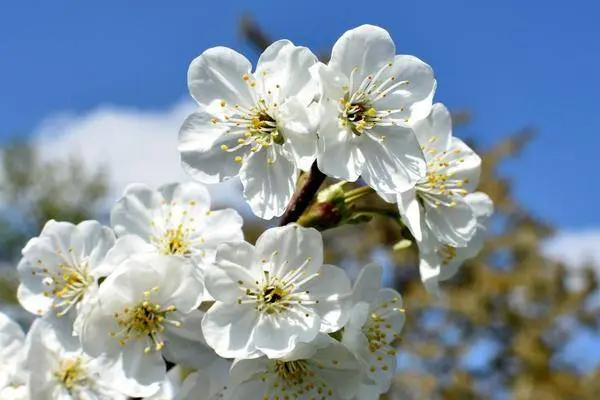
This cherry is partially self-fertile (capable of setting from 5 to 18% of fruits from its own pollen). However, in order to obtain a more generous harvest and improve its quality, it is recommended to plant a cherry of a different variety in the vicinity of it – a pollinator.
Cherry pollinators A gift to teachers should be close to it in terms of flowering, fruiting period and longevity. Plants should be planted at a distance of no more than 35–40 m from each other, while taking into account that there are no flowering trees of other crops between them (for example, apple trees, pears). In this case, the varieties will be well pollinated by bees – as well as other insects – and successfully set fruit.
So, in a cool and rainy spring, flowering can stretch for more than a week. Insects will not be able to actively visit the flowers, and the latter will crumble. In the case of a warm spring, both early and late varieties can bloom and pollinate at the same time.
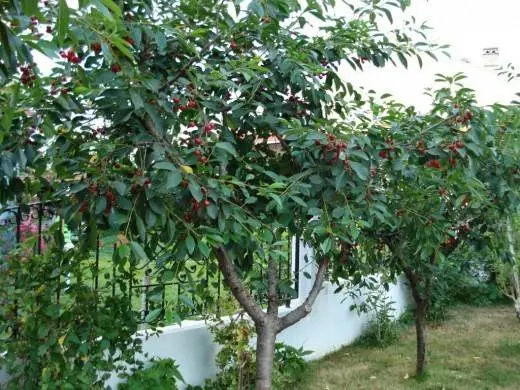
The presence of nearby bee hives will also create excellent conditions for productivity.
Cherry fruits ripen A gift to teachers early (by the beginning of July).
yield, fruiting
Cherry trees of this variety begin to bear fruit in the fourth year of life. They differ in average yield (53,3 kg / ha, or approximately 7–10 kg per tree).
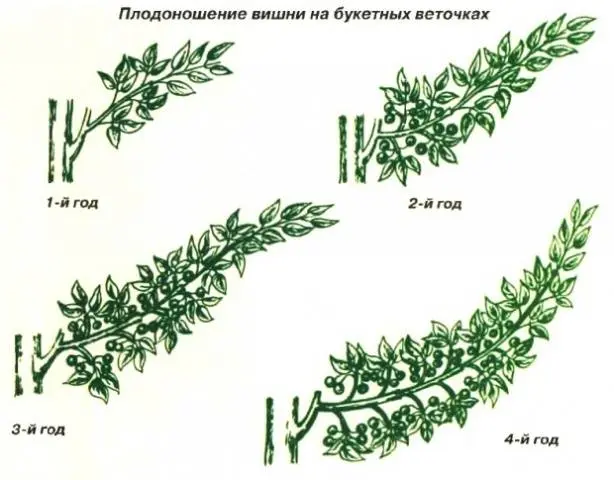
The composition of cherry fruits A gift for teachers (for every 100 g) is rich in:
- ascorbic acid (more than 15 mg);
- catechins (more than 300 mg);
- anthocyanins (more than 200 mg).
The percentage of solids in them is about 18,2%, acids – 1%, sugar – almost 12%.
Scope of berries
Cherry fruits Gift for teachers are juicy, have a sweet and sour taste. The variety is considered table, but it is often used for making jams and compotes.
The tasting score of this cherry is 4,3 points (with a maximum of 5).
Disease and pest resistance
One of the main characteristics of the cherry variety Gift to teachers is the relatively high resistance of the variety to coccomycosis, the most dangerous fungal disease that affects stone fruits. This cherry is moderately resistant to monilial fruit rot. At the same time, this variety is rather weakly resistant to other fungal diseases (anthracnose, scab, perforated spotting).
To learn how to deal with fungal diseases of cherries, the video will help:
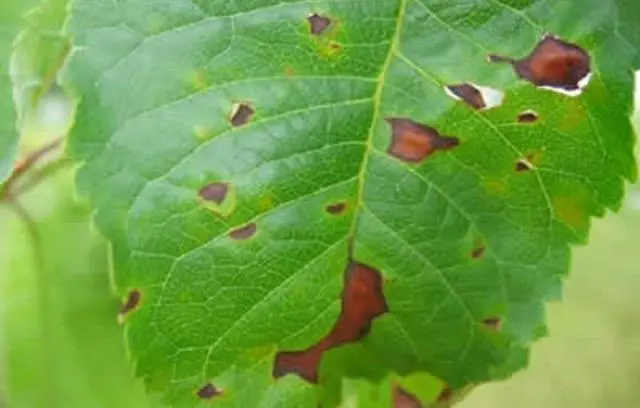
Significant harm to cherry trees Gift to teachers, as well as cherry trees of other varieties, can be caused by:
- parasitic fungi;
- insect pests – worms, aphids, ringed silkworm, weevil, shoot moth, etc .;
- birds (spoil crops).
Advantages and disadvantages
Advantages | Disadvantages |
Early fruit ripening | Not highly resistant to most fungal diseases |
Stable yield | Weak drought tolerance |
Winter-hardy variety | Average taste qualities of fruits |
High heat resistance |
|
Relative resistance to coccomycosis and monilial fruit rot |
|
Partial self-fertility |
|
Fruits are rich in nutrients |
|
Features of landing
Recommended dates
The timing of planting a cherry tree depends on the region:
- in the areas of the middle lane, it is preferable to plant cherries in the ground in early spring, when the frosts stop and the soil thaws and dries slightly;
- in the southern and central regions with a milder climate, autumn (October) planting can be carried out – about a month before the soil starts to freeze.
Choosing the right place
For cherries of this variety, light (sandy and sandy loamy) soils, loose and loose, as well as medium loamy soils are preferred. Soil acidity should be neutral.
The site must be chosen well-lit (preferably on the south side), taking into account the longevity of the cherry and the possibility of its growth.
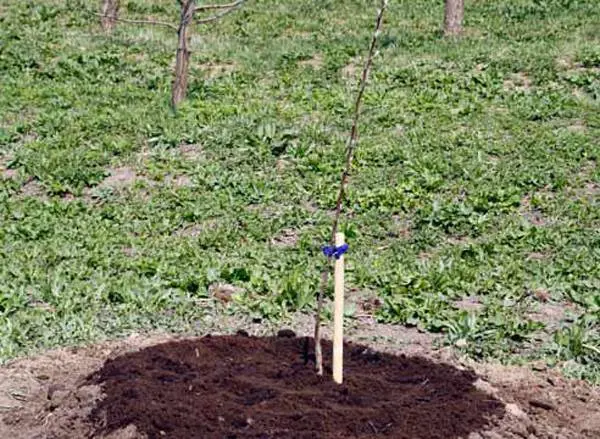
What crops can and cannot be planted next to cherries
The best neighbors for cherries Gift for teachers will be:
- cherry trees of other varieties;
- cherries;
- Rowan;
- grapes;
- hawthorn;
- elder.
You should not plant such crops next to it:
- Linden;
- Birch;
- maple;
- apricot;
- nightshade vegetables (eggplant, pepper, tomato);
- some shrubs (raspberries, gooseberries, sea buckthorn).
Selection and preparation of planting material
Cherry seedlings can be chosen as a gift for teachers as a two-year-old or one-year-old, but you should, first of all, pay attention to the roots: they must be healthy, not damaged and not damaged by insects.
After the purchase, the roots of the seedlings are moistened with water, wrapped with a cloth, and then with a film. Before autumn planting, they should be immersed in water for 6-10 hours (after slightly cutting the tips).
If planting is planned in the spring, seedlings, as a rule, are acquired in the fall, and they are added dropwise for the winter, covering the ground with spruce branches over the roots.
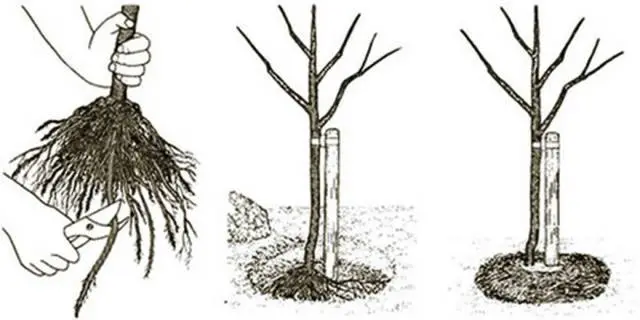
Landing algorithm
Cherry planting A gift for teachers is done as follows:
- in the garden, a planting hole should be prepared about 60 * 60 * 60 cm in size;
- drive a stake (about 1 m high) into the center of the pit – it will serve as a support for the plant;
- first, apply fertilizer to the bottom, then pour 5–8 cm of fertile soil;
- expose a seedling, straighten its roots;
- fill the hole, tamping the soil well and forming a hole around the seedling;
- water the plant with two or three buckets of water;
- fill the hole with earth, humus or peat;
- carefully tie the cherry to the support.
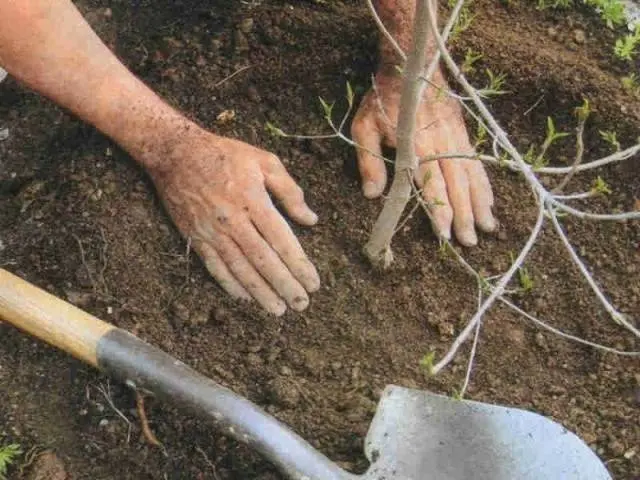
Culture aftercare
Pruning cherries A gift to teachers after planting is that all branches of the seedling, including the central shoot, are shortened by about a third, leaving three buds. In the second and third years of life, cherries carry out formative pruning.
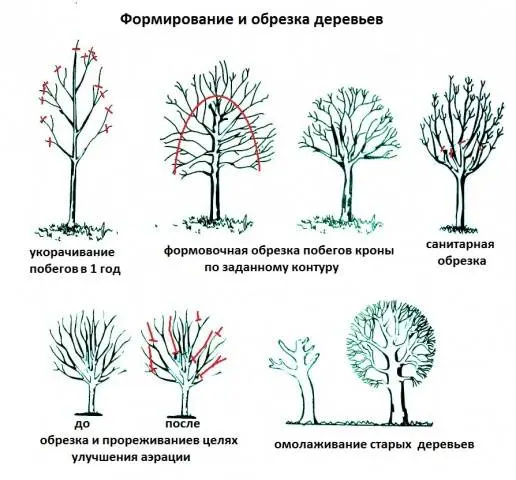
Cherries are watered several times a season:
- at the end of spring;
- at the beginning of August;
- before the onset of cold weather.
Schedule of the main dressings of cherries Gift for teachers:
Deadlines | fertilizers |
Simultaneously with the first watering | Mineral, manure solution with wood ash |
After 2 weeks | Mineral |
Before winter comes | Organic, phosphorus-potassium |
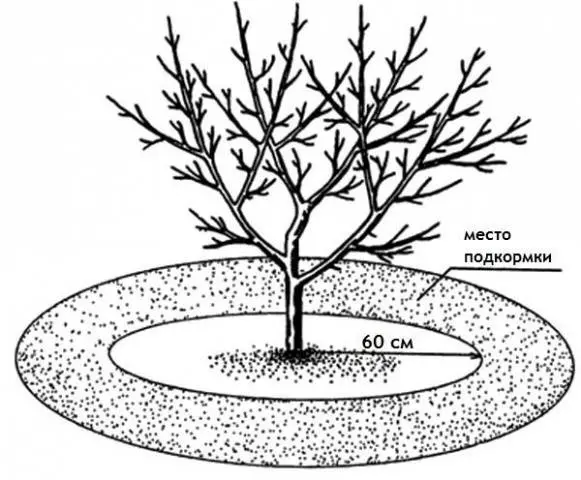
To protect cherry trees from rodents, it is recommended:
- wrap the trunks with a plastic mesh with small cells;
- soak the sawdust with an aqueous solution of carbolic acid (5 g per 1 liter) and spread them in tree trunks;
- spread coriander inflorescences under young cherry seedlings.

Diseases and pests, methods of control and prevention
| Diseases/Pests | Symptoms/characteristics | Warning and ways to fight |
| Antraknoz | Dull pinkish spots on the berries, growing into tubercles. Subsequently, the berries are mummified | Triple treatment of the plant with a solution of polyram (20 g per 10 l of water) |
| destroyed | Cracks and velvety marsh-brown marks on fruits | Warning – spraying cherries with nitrafen before the buds open. Treatment – triple treatment of the tree with Bordeaux liquid (1%) |
| perforated spotting | Red-brown foci, then – through holes on the leaves, the bark cracks on the shoots, the fruits dry and become disfigured | Collection and burning of diseased leaves, fruits and shoots. Treatment of trees before bud break with iron sulphate or Bordeaux mixture (3%) |
| aphid | Colonies of black shiny beetles (up to 2 mm in size), sucking juice from plants | Destruction of weeds. Spraying cherries with infusions of garlic, onion, dandelion, ash |
| Weevil | A bronze-green beetle with a raspberry tint that feeds on buds, flowers, and later on ovaries. | Loosening the soil under the trees. Spraying with Fufanon and Kinmiks |
| ringed silkworm | A dark gray furry caterpillar that feeds on leaves and buds. “Web” on cherry branches | Removal and burning of egg clutches. Treatment of a tree with nitrafen before the buds open |
| Shoot moth | Yellow-green caterpillar destroying buds and young foliage | Loosening the soil under the trees. Spraying cherries with Intravir or Decis during the period of bud growth |
| Parasitic fungi | Honey mushrooms or tinder fungi growing into the lower part of the trunk | Remove the parasite, clean the wound, treat it with copper sulfate (3%) and cover it with garden pitch |
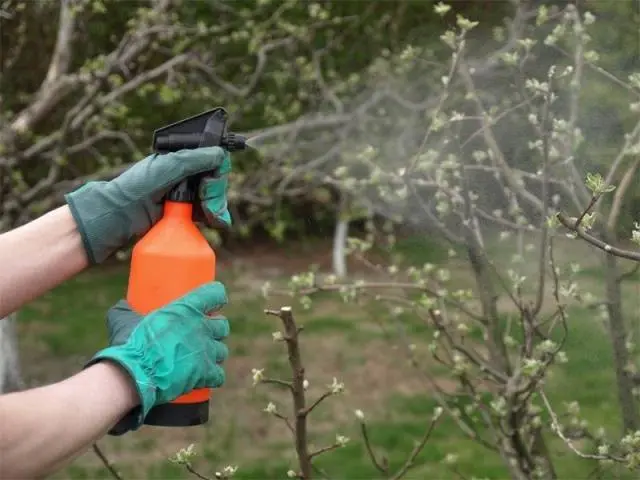
Conclusion
Cherry common A gift to teachers is an early productive variety, cold and heat resistant, characterized by partial self-fertility, grows well in the regions of the Central Black Earth region. However, this variety does not tolerate drought well, and also has poor resistance to most fungal diseases – one should not forget about this when choosing it for a personal plot.










